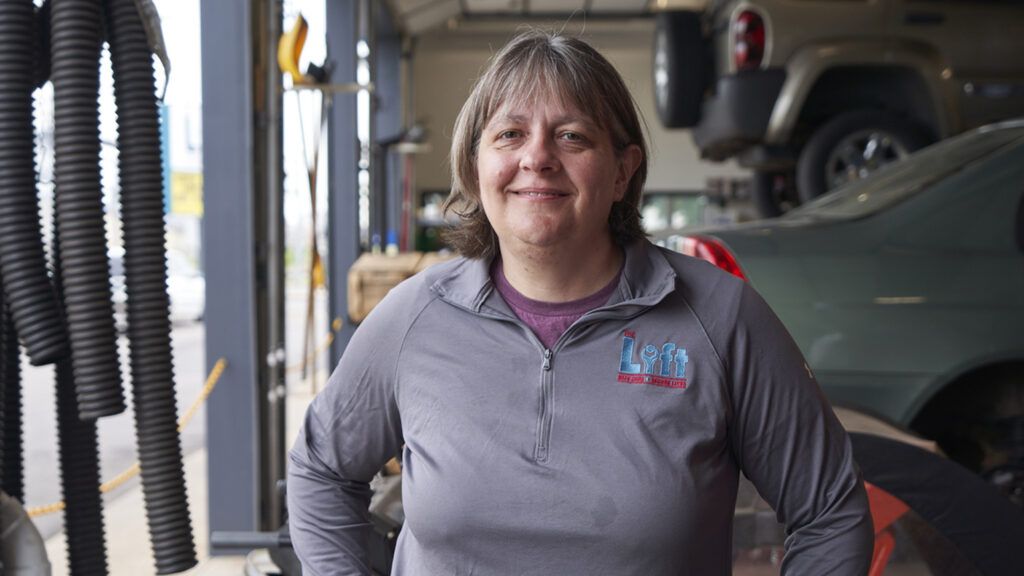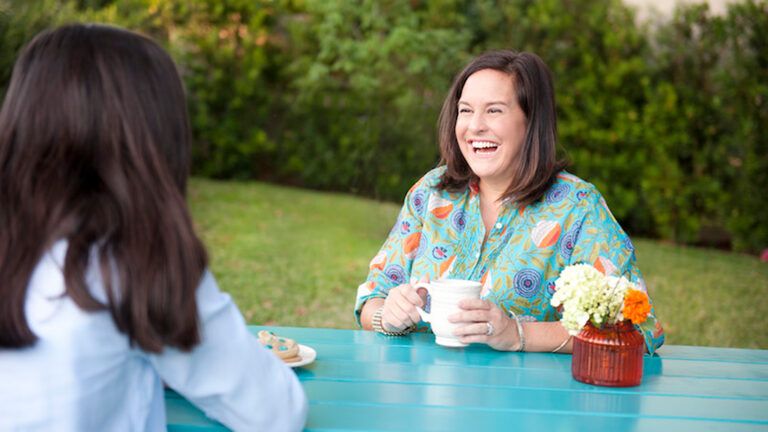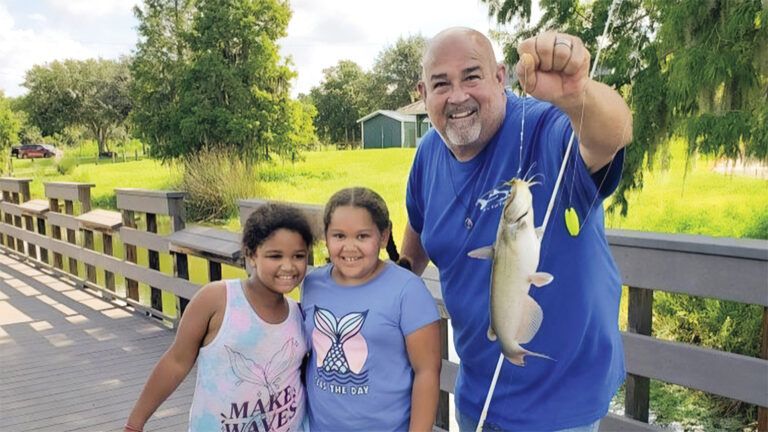You’d think someone who had spent the past 20 years in ministry, who felt called by Matthew 25:40 to serve the most vulnerable, would have no issues trusting God. But the minute I stepped into that cavernous garage one day in June, I questioned where I was being led. What the heck am I doing here?
Lifts ran down one side of the space. Tools and auto parts hung from the walls, spilled out of cabinets. The air smelled of engine oil and axle grease. The room was a cacophony of male voices. Nothing like the quiet church I was used to working in.
I walked toward the source of the noise, a knot of young men half my age—18, 19 years old. Suddenly everything went quiet. Some 20 pairs of eyes stared at me.
“I’m Cathy Heying,” I said. “Here to start automotive school.”
The burly instructor, Dave DuVal, said, “Join us, Heying!” It was more of an order than a welcome. “First, pair off into lab partners,” Mr. DuVal barked like a drill sergeant. “You’ll be working together for the next two years.”
Two years! Was I really committing myself for that long? My mind flew to how I’d ended up here at Dunwoody College of Technology at age 38. Maybe I’d find reassurance in the memory.
I had always been sensitive to people’s struggles. I got a degree in social work, with a minor in religious studies. Then a master’s in pastoral ministry. It seemed natural to work in a church. I started as a youth and young adult minister, then became director of social justice outreach at St. Stephen’s in Minneapolis. A job I loved. Nine years of engaging our parishioners on systemic issues that keep people in poverty and reinforce racism.
St. Stephen’s actively worked to answer the Gospel question: “When did we see you hungry, thirsty, naked or a stranger in need?” The neighbors came with their requests.
Most memorable to me were the attachments people had to their cars.
They would tell me, “I need my car to get to my job in the suburbs.” Or a doctor’s appointment. A relative they cared for. Their vehicle was a place to keep their few possessions, a place to be during the day—or to sleep in at night if they couldn’t get a bed at our shelter. Their car was safety and home.
I was ready to offer a shelter bed, a meal from the meal program or access to free clothes, but I had nothing to help with car repairs or maintenance.
Someone should take this on, I thought. I called other social service agencies looking for a place I could refer these clients to. No group—no one—in all of Minneapolis could help. I certainly couldn’t. I didn’t know a thing about cars. I’d never even changed a tire.
People kept coming into St. Stephen’s asking for help with car repairs. God, this is obviously an urgent need, I prayed time and again. Please find someone to step up and do something about it. I listened for his still, small voice. Looked for signs. Finally I heard what I didn’t want to acknowledge. God wanted me to take this on.
I had the germ of an idea. What if I opened a nonprofit auto garage that offered affordable repairs? Okay, but who would do the repairs? God’s answer was the same.
So I’d found myself at Dunwoody College of Technology in the spring of 2008 to ask about its automotive program. I met Mr. DuVal and told him about my idea of starting a garage to serve low-income folks. He nodded and said gruffly, “The program’s almost full. If you’re serious, I need your application tomorrow.”
The cost for the two-year program was some $40,000. Though I was still paying off student loans from grad school, I knew I had to try to make my idea a reality. I felt I was being called.
All my good intentions didn’t mean a thing in the Dunwoody garage on the first day of automotive school. I could tell by the way my teenage classmates tossed around terms like torque and power train that they were gearheads, guys who were totally into how cars worked. I was a middle-aged woman, a social worker and minister with zero mechanical inclination. I was all about feelings, emotional connections. I couldn’t have been more out of place.
No surprise that none of the guys rushed to be my lab partner. I ended up paired with a young man who was too shy to look up from his shoes.
“Everyone, line up facing the wall with the crankshafts,” Mr. DuVal said. My gaze roamed over the engine parts that covered the walls. Any of them could be a crankshaft for all I knew. My only recourse was to watch my classmates and copy what they did.
Come on, Cathy. I gave myself a pep talk. You’re a quick learner. You earned a master’s. How hard can this be?
Harder than anything I’d ever done, as it turned out. Automotive school kicked my butt. Every word out of Mr. DuVal’s mouth sounded foreign. Pistons. Manifolds. Gudgeon pins. I couldn’t connect what I read and reread in the textbook to the cars in lab. I felt uncoordinated, humiliated and inadequate—every single day. The barrage of testosterone-fueled talk, banging tools and rapid-fire instructions threw me off. I studied late into the night while dreading the next morning’s class.
Halfway through the semester, we were assigned to flare brake lines, using a tool to cut the end of the tube that carries fluid to the brakes so that it maintains a tight connection. No matter how hard I tried, I couldn’t do it.
“Heying, what’s taking so long?” Mr. DuVal yelled from across the room.
My hands were shaking so badly, I couldn’t hold the tubing steady. Tears of frustration streamed down my cheeks. My lab partner seemed embarrassed for me.
At the end of class, the other students trooped out. I went to Mr. DuVal. “My brain doesn’t work this way,” I said. “I’m quitting.” I was still working part-time at St. Stephen’s. God would have to find someone else.
Mr. DuVal glared at me. “Heying, I’m not going to let you quit!” he said, his voice rising. “I believe in you. I believe in your vision. You can do this. And I’ll be there to help you every step of the way. I’m going to watch you walk across that stage as a graduate in two years. Now get over there and flare those brake lines.”
It felt as if I’d been dropped into one of those inspirational movies with the tough-as-nails coach leading his hapless team to the championship. Except there was no rousing soundtrack. No teammates lifting me up. Just Mr. DuVal. And the knowledge that there was no way out but through.
I trudged back to my workstation. Tried again. And again. On the fourth try, I flared those brake lines. “You’ll get there, Heying!” Mr. DuVal said.
Eighteen months and many more tears and after-class sessions with Mr. DuVal later, I graduated in June 2010. There was still so much to learn. I worked mornings at St. Stephen’s and got an afternoon job at a Sears service center to keep up my tech skills.
Making connections with anyone who’d listen to my vision, I found a business mentor and wrote a detailed four-year plan for opening my garage, including fundraising and marketing, forming a nonprofit board, dealing with the legal paperwork, searching for a location.
The summer of 2012, I launched a nonprofit called The Lift Garage. Dave DuVal was one of the first board members. Not long afterward, one of my connections called. An auto shop owner, she was struggling financially and needed some rental income. “I think you should lease one bay from me,” she said.
I laughed. “I don’t have the funding, the tools, the mechanics, nothing.”
A few months later, she called back. Again, I said no. In January 2013, she called a third time. “I really feel like you need to do this,” she said.
I was about to tell her I was nowhere near ready, but something in her tone gave me pause.
In that moment, I heard another voice. Not the still, small voice I’d always tried to listen for, but a loud and demanding one. Honestly it sounded a lot like Mr. DuVal. Heying! I’m opening the door here. You need to step through!
It was time to let go and let God.
I went to my board. “I know this is crazy,” I said. “We’re not ready, but I think we need to do this.” The board agreed, and we signed the lease. The first thing we’d need was insurance. Thirteen companies rejected us before we got coverage at a very high cost.
For the next year, The Lift Garage operated out of the single bay one day a week. When I wasn’t doing repair work, I was writing grant proposals and fundraising letters. Almost immediately, I had a full schedule of customers, people who shared the same stories I’d heard at St. Stephen’s. This time, however, I could offer help.
One day, a woman named Kelly came to the garage, hoping I could get her car running again. When I told her she needed a new starter and the charge would be $100, she burst into tears of relief. She told me that she was in an abusive relationship. “I’ve been trying to save enough money to get my car fixed so I could leave,” she said. “I don’t know how to thank you!”
Seeing how a simple repair would change Kelly’s life was thanks enough.
Today The Lift Garage employs five full-time mechanics and three service writers, doing about 120 repairs a month. By charging for parts at cost and only $15 an hour for labor, our bills are about 75 percent less than what a for-profit shop would charge. We’ve saved low-income Minnesotans more than two million dollars in car repairs.
There’s always more demand than we can meet. I hear from people across the country who want to follow in our footsteps. I could never have pictured any of this happening. Good thing God has a much better imagination!
For more inspiring stories, subscribe to Guideposts magazine.






